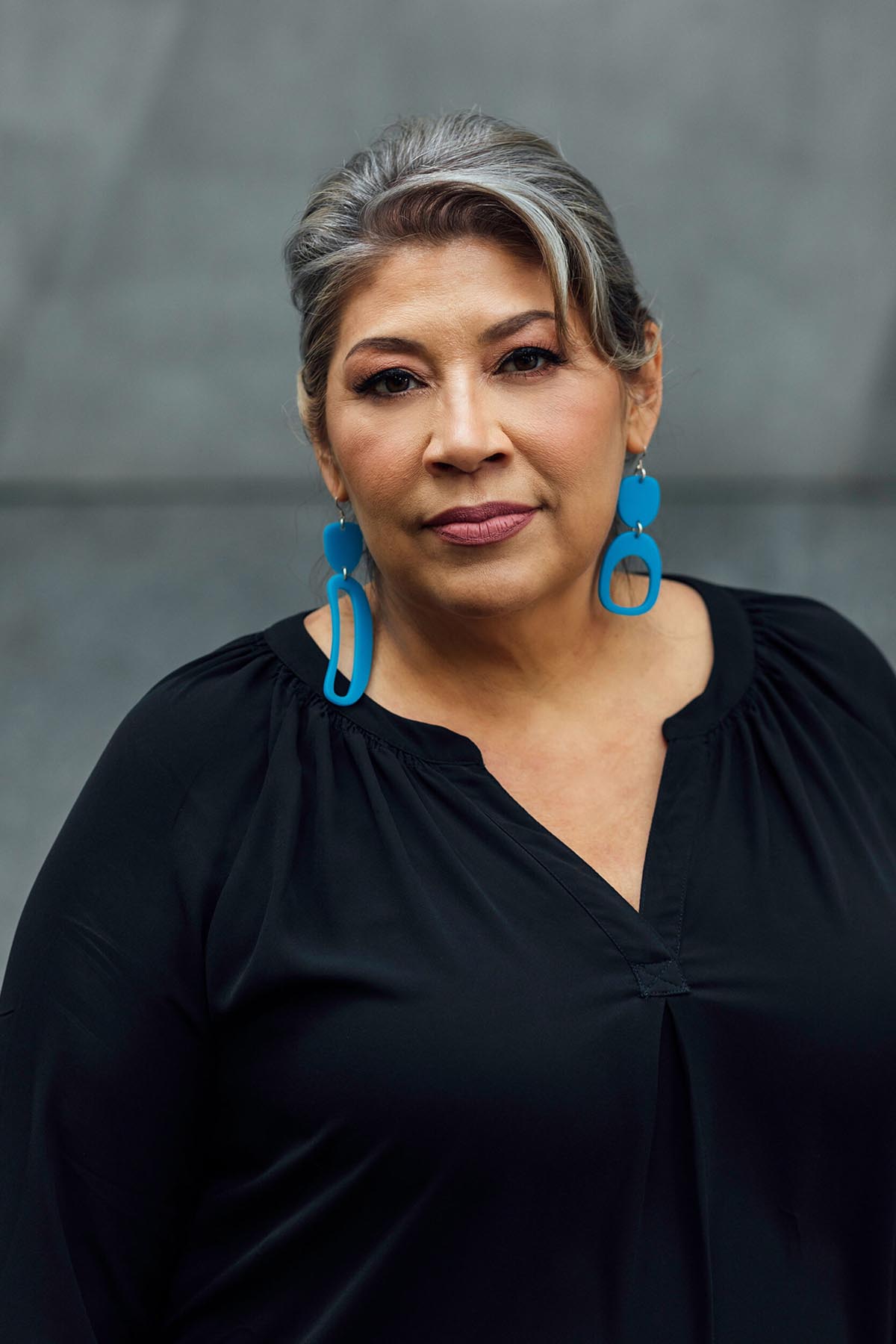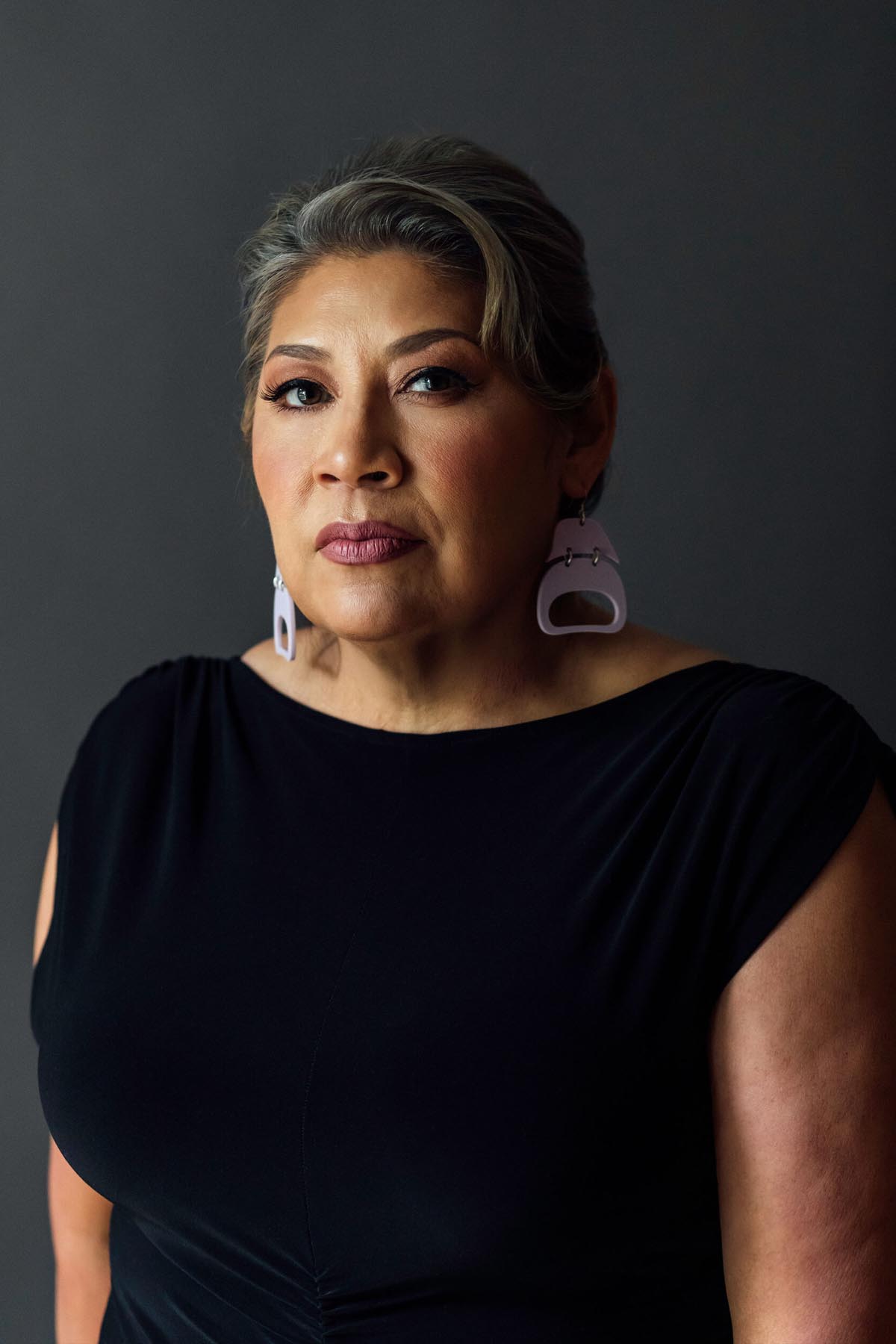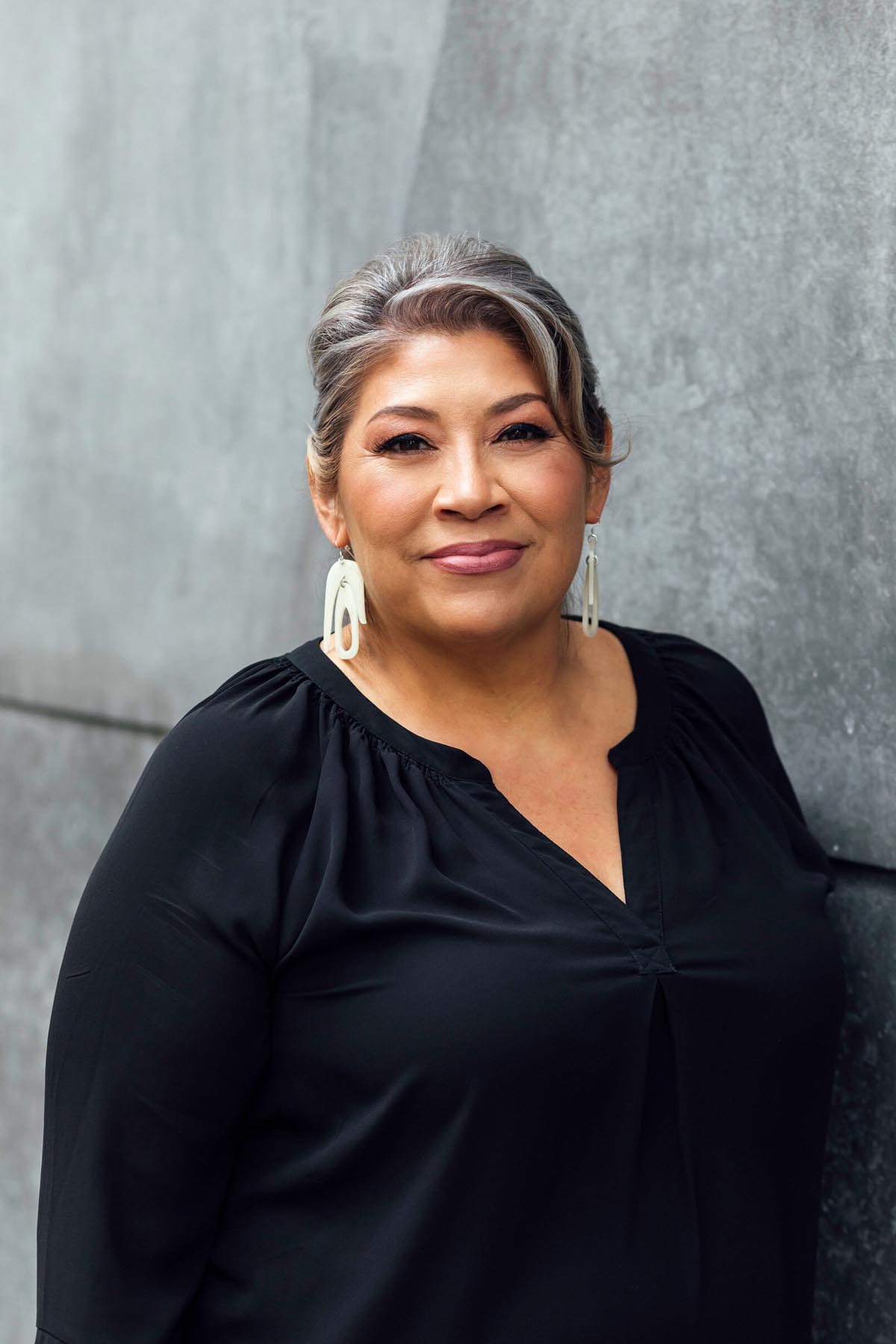Dr. Kim Tallbear
Professor, Department of American Indian Studies, University of Minnesota – Twin Cities campus
Enrolled Sisseton-Wahpeton Oyate. Formerly enrolled in the Cheyenne & Arapaho Tribes of Oklahoma.

Dr. Kim Tallbear
Professor, Faculty of Native Studies, University of Alberta
Canada Research Chair (CRC) in Indigenous Peoples, Technoscience, and Society
Decolonial Sexualities #IndigenousSTS #TipiConfess
Enrolled Sisseton-Wahpeton Oyate. Descended from the Cheyenne & Arapaho Tribes of Oklahoma.

About Kim Tallbear
I am a citizen of the Sisseton-Wahpeton Oyate in present day South Dakota, USA through my maternal line. I am also eligible for citizenship through my maternal grandfather in the Cheyenne and Arapaho Tribes in present day Oklahoma. I was raised on the Flandreau Santee Sioux Tribe reservation in South Dakota where many of my maternal relatives also reside, and in St. Paul, Minnesota by my mother, grandmother, and great-grandmother.
In August 2015, I immigrated to Canada to take up a position as Professor in the Faculty of Native Studies at the University of Alberta. I came to the University of Alberta to work with one of the strongest groups of Indigenous Studies scholars anywhere in the world. In 2016, the Government of Canada awarded me a Tier II Canada Research Chair (CRC) in Indigenous Peoples, Technoscience, and Environment. In 2021, I was awarded a Tier I CRC in Indigenous Peoples, Technoscience, and Society. Along with my collaborators, I am building a research and training program at the University of Alberta that is focused on Indigenous peoples’ engagements with science and technology as those fields and projects serve Indigenous sovereignty.
In August 2025, I began an appointment as Professor of American Indian Studies at the University of Minnesota – Twin Cities campus. I am happy to have returned to Dakota homelands, especially in this political moment when I want to be with family.
I originally trained to become a community and environmental planner at the University of Massachusetts, Boston and the Massachusetts Institute of Technology, Department of Urban Studies and Planning (DUSP). From 1992-2001 I worked on various planning projects for national tribal organizations, tribal governments, federal agencies and in private consulting. I worked primarily on projects having to do with tribal government interests in nuclear waste management and on a U.S. Department of Energy (DOE) funded project to explore the ethical, legal, and social implications (ELSI,) for Indigenous peoples of human genetic research. Realizing that my deeper intellectual interests were in the cultures and politics of science and technology and their implications for US-based tribes and other Indigenous peoples, I returned to graduate school. In 2005, I completed a Ph.D. at the University of California, Santa Cruz in History of Consciousness. Working with Professors James Clifford and Donna Haraway, I wrote a dissertation exploring the concept of “Native American DNA” as an object of human population genetics research and as a focus of the direct-to-consumer (DTC) genetic ancestry testing industry. I taught for 18 months at Arizona State University in Tempe in the Department of American Indian Studies before spending one year as a President’s Postdoctoral Fellow in both Gender & Women’s Studies and in the Department of Environmental Science, Policy and Management (ESPM) at the University of California, Berkeley. In 2008 I was hired as Assistant Professor of Science, Technology, and Environmental Policy in the ESPM Division of Society & Environment. During the 2012-13 academic year, I was a Donald D. Harrington Fellow in Anthropology at the University of Texas, Austin. In 2013 I accepted a position as Associate Professor of Anthropology and Native American and Indigenous Studies (NAIS) at Texas.
For two decades, I studied how genetic science is co-constituted with notions of race, “tribe,” and “indigeneity.” My monograph on the subject is titled Native American DNA: Tribal Belonging and the False Promise of Genetic Science (2013).
More broadly, I am interested in the historical and ongoing roles of science and technology (technoscience) in the colonization of Indigenous peoples and others. Yet because tribes in the US and other Indigenous peoples insist on their status as sovereigns, I am also interested in the increasing role of technoscience in Indigenous governance. How do U.S. tribes and other Indigenous peoples resist, regulate, collaborate in, and initiate research and technology development in ways that support Indigenous governance? What are the challenges for Indigenous peoples related to science and technology, and what types of innovative work and thinking occur at the interface of technoscience and Indigenous governance? Finally, does Indigenous governance of and through research and technology development influence the priorities, practices, and values of technoscientific fields? My research, collaborations and teaching draw on Indigenous, anti-colonial, feminist, and queer science studies analyses that enable not only critique but generative thinking about the possibilities for decolonizing science and technology.
From 2010-2013, I served as an elected member of the Council of the Native American and Indigenous Studies Association (NAISA). I am a former Pierre Elliott Trudeau Foundation (PETF) Fellow (2018-2021). I have also served as a member of the Executive Program Committee (EPC) for the 2016 American Anthropological Association (AAA) annual meeting and an organizer of the “Unsettling Science” plenary panels at the 2021 Society for Social Studies of Science (4S) annual meeting. I was an original faculty member for the University of Illinois’ Institute for Genomic Biology Summer internship for INdigenous peoples in Genomics (SING) USA and have also advised the President of the American Society of Human Genetics (ASHG) on issues related to genomics and Indigenous peoples. In 2018, I co-founded the Summer internship for INdigenous peoples in Genomics (SING) Canada. I am also an advisory board member for the Science & Justice Research Center at the University of California, Santa Cruz.
In the last decade, in addition to studying genomics and other scientific and technological disruptions and challenges to Indigenous lands, self-definitions, and governance, I have turned my attention to colonial disruptions to Indigenous sexual and kin relations. I have published and spoken widely on the role of compulsory marriage, monogamy, and heterosexuality in relation to private property in settler-colonialism in the US and Canada. In 2015, I co-founded the Edmonton-based sexy storytelling and cabaret show Tipi Confessions with co-producers Kirsten Lindquist and Dr. Savage Bear. You can learn more about the show on our web page or by listening to this fantastic interview with Rosanna Deerchild from CBC’s Unreserved.
Finally, I am a widely-known public intellectual and commentator in popular media outlets including CBC, CNN, The Washington Post, The New Yorker, the LA Times, APTN, and the BBC on topics pertaining to Indigenous peoples, science, and technology; the politics of self-indigenization; and Indigenous sexualities. You can follow my latest contributions to public discourse on all of the aforementioned topics on my Substack newsletter, Unsettle: Indigenous Affairs, Cultural Politics & (De)colonization.
EDUCATION
Ph.D., History of Consciousness
University of California at Santa Cruz
MCP
MCP (Environmental Policy & Planning)
Department of Urban Studies and Planning, Massachusetts Institute of Technology
B.A.
B.A. in Community Planning
University of Massachusetts at Boston
TEACHING INTERESTS
Indigenous and feminist science studies
Including animal studies and “new materialisms”
Politics of indigeneity
Politics of nature
Native Americans, nature, and culture; queer ecologies
Indigenous queer theory and (de)colonial sexualities
POSITIONS
2020 to Present
Professor
Faculty of Native Studies
University of Alberta
2014 to 2020
Associate Professor
Faculty of Native Studies
University of Alberta
2013 to 2015
Associate Professor
Department of Anthropology
University of Texas at Austin
2008 to 2014
Assistant Professor
Assistant Professor of Science, Technology, and Environmental Policy Department of Environmental Science, Policy, and Management (ESPM)
Division of Society and Environment
University of California, Berkeley
2011 to 2014
Visiting Associate Professor
School of Political Science and Economics
Meiji University, Tokyo, Japan
2012 to 2013
Donald D. Harrington Fellow
University of Texas, Austin
2007 to 2008
President’s Postdoctoral Fellow
University of California, Berkeley
2006 to 2007
Assistant Professor
Arizona State University, Tempe
Bio
Kim TallBear (she/her) is a citizen of the Sisseton-Wahpeton Oyate, a Dakota nation in present-day South Dakota. She is a Professor in the Department of American Indian Studies, University of Minnesota – Twin Cities campus. She earned a B.A. in Community Planning at the University of Massachusetts-Boston and a Master’s in City Planning (environmental policy and planning) at the Massachusetts Institute of Technology. She earned her PhD in History of Consciousness at University of California, Santa Cruz. She is the author of Native American DNA: Tribal Belonging and the False Promise of Genetic Science. Dr. TallBear is the co-founder of the Summer internship for INdigenous peoples in Genomics (SING) Canada. She has advised the President of the American Society of Human Genetics (ASHG) on issues related to genomics and Indigenous peoples. She has also advised museums on exhibits related to race and science. In addition to studying genome science disruptions to Indigenous governance and to Indigenous self-definitions, Dr. TallBear studies colonial disruptions to Indigenous sexualities. She is a regular panelist on the weekly Indigenous current affairs podcast, Media Indigena. She is also a regular media commentator in outlets such as CBC, CNN, The Washington Post, The New Yorker, the LA Times, APTN, and the BBC on topics pertaining to Indigenous peoples, science, and technology; on the politics of self-indigenization; and on Indigenous sexualities. She is a former Pierre Elliott Trudeau Foundation (PETF) Fellow (2018-2021). You can follow her on Bluesky @kimtallbear.bsky.social and read her occasional posts on her Substack newsletter, Unsettle: Indigenous affairs, cultural politics & (de)colonization.







